GET OUR BEST DEAL OFFER FOR YOUR BUSINESS
We offer top of the line surveillance and security solutions, so you can always stay informed about what’s happening around your business property.
We offer top of the line surveillance and security solutions, so you can always stay informed about what’s happening around your business property.
Go Safer Security: Maryland’s Premier Fire Extinguisher Inspection Service. Rely on us for thorough and expert fire extinguisher inspections, ensuring the safety of your property and loved ones. Stay compliant and secure with our professional inspection services, dedicated to upholding the highest standards in fire safety.
Regular inspection of fire extinguishers is essential to any safety program, including both maintenance and testing of their operational capacity. This task may be carried out by an external specialized third party, or by the company’s own security team.
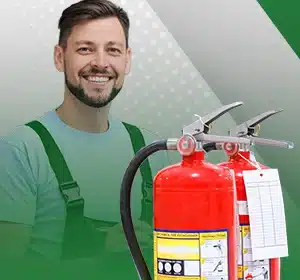
Regular inspection of fire extinguishers is essential to any safety program, including both maintenance and testing of their operational capacity. This task may be carried out by an external specialized third party, or by the company’s own security team.
An inspection must, therefore, be completed at least twice a year, although if the agent reports “Fire” alarms, this inspection should be longer. It must also come with the declaration of availability of equipment, together with inventories and periodic maintenance records.
Specific safeguards must also be implemented for areas with high risk according to the classification of the above-mentioned life safety protocols, and that is where the use of automatic extinguishers must be applied.
These automatic extinguishers are distinguished because they include greater safety and effectiveness in fires, being that they are applied by passersby, who activate them automatically, or they are applied directly by an agent, who activates them from a safe distance.
It is also essential that the agent in charge identify and record any adverse situation that may affect the correct operation of the fire protection equipment, as well as the condition of the installation itself.
The agent in charge must also verify and complete the reports of any anomaly detected during the inspection, such as equipment operation anomalies, and must report these to the responsible team.
The agent in charge must also verify and complete the reports of any anomaly detected during the inspection, such as equipment operation anomalies, and must report these to the responsible team.
An ABC powder fire extinguisher has numerous advantages as it is a multi-purpose extinguisher and is therefore one of the most common extinguishers to have on hand.
A powder extinguisher sprays a very fine chemical powder composed most commonly of monoammonium phosphate. This acts to blanket the fire and suffocate it.
Powder extinguishers are effective for class A, B and C fires, since it is not an electrical conductor and since it can effectively break the chain reaction in a liquid or gas fire, something a water extinguisher cannot do.
A carbon dioxide fire extinguisher (CO2) is one of the cleanest types of extinguishers to use as it leaves no residue and requires no cleanup.
The CO2 extinguisher does exactly that – extinguishes CO2. By doing so, it removes oxygen from the fire, effectively suffocating it of oxygen. It is perfect for use on class B fires that involve flammable liquids and on electrical fires.
The wet chemical extinguisher is a specialized type primarily focused on class K fires, those involving cooking media such as animal and vegetable fats or oils.
These extinguishers contain a solution composed of potassium that effectively launches a two-pronged assault on fires.
First, the liquid mist it sprays acts to cool the fire. Second, due to the chemical reaction of the solution with the cooking medium, a thick soap-like substance forms, sealing the surface of the liquid to prevent re-ignition.
The wet chemical extinguisher, then, is ideal for a kitchen setting and class K fires. However, it can also be effective for class A fires where a material such as wood or paper has caught fire.

The most versatile of the set, the water mist extinguisher, uses a newer technology that works across most classes of fire.
This type of extinguisher releases microscopic water molecules that fight the fire on a variety of levels. First, because so much water is dispersed in such a microscopic fog-like form, the level of oxygen in the air is decreased, which helps to suffocate the fire.
Second, the water particles are drawn to the fire and, as water always does, acts to cool it, reducing the temperature.
Finally, and perhaps what is most unique about the water mist extinguishers, is that the water has been de-ionized (the minerals have been removed). As a result, it can actually be used on electrical fires, as the de-ionized water will not act as a conductor, as well as on burning liquids/gases that a standard water extinguisher could not be applied to.
Thus, a water mist extinguisher is safe and effective for use on classes A, B, C and K fires.
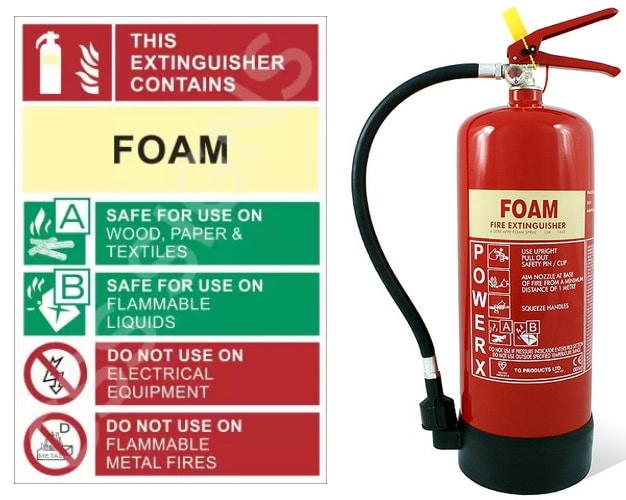
Foam fire extinguishers are suitable for class A and the flammable liquids of class B, though not effective for gaseous fires.
They spray a type of foam that expands when it hits the air and blankets the fire. This blanket prevents the vapors from rising off the liquid to feed the fire, thus starving it of fuel. Also, because the foam is mixed with water, it has a cooling effect as well.
Foam extinguishers are some of the best for liquid fires, such as gasoline fires, but can also be used on Class A fires involving solid combustibles like wood.
A powder extinguisher sprays a very fine chemical powder composed most commonly of monoammonium phosphate. This acts to blanket the fire and suffocate it.
Powder extinguishers are effective for class A, B and C fires, since it is not an electrical conductor and since it can effectively break the chain reaction in a liquid or gas fire, something a water extinguisher cannot do.
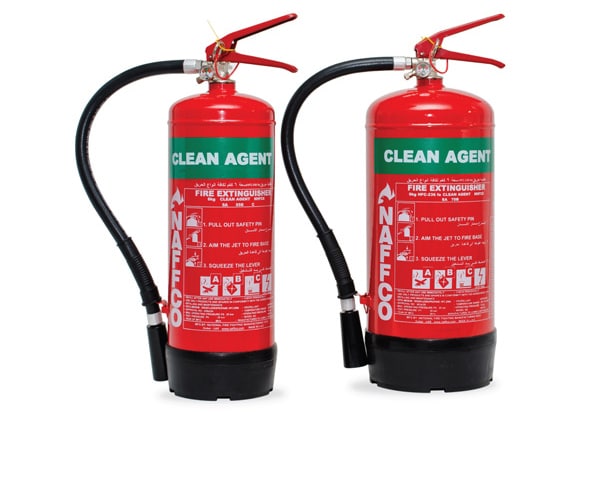
A clean agent fire extinguisher is a type of gaseous fire suppression. Stored in its liquid form, when it is sprayed and hits the air, it converts to its gas form which is non-conductive, safe for use while humans are present, leaves no residue, and has a very short atmospheric lifetime, making it eco-friendly.
The gas, often composed of Halon, extinguishes fire by reducing the oxygen levels and impeding the chain reaction. Because it is non-conductive and so clean, it is ideal for rooms or businesses filled with electrical and computer equipment. They are most commonly used for class B and C fires.
Fire extinguisher service is an important task that must be done regularly in order to keep the fire extinguishers up-to-date and functioning properly. During a fire extinguisher service, a qualified technician will inspect the fire extinguisher for any signs of damage or wear, as well as check to make sure it has the correct amount of pressure. They will also check to ensure that the fire extinguisher is properly labeled and located in accordance with local regulations. Finally, they will refill or replace the fire extinguisher if necessary.
In addition to performing regular inspections, a technician may also perform maintenance tasks such as cleaning and lubricating parts, replacing seals and O-rings, and testing for leaks. These maintenance tasks are necessary to ensure that the fire extinguisher is in proper working condition and ready for use in case of an emergency.
Fire extinguisher service is essential for keeping your home or business safe from fires.
Fire extinguishers should be inspected and maintained on a regular basis to ensure they are in proper working order. The frequency of maintenance depends on the type of fire extinguisher and the environment it is used in.
For example, portable fire extinguishers should be inspected monthly and serviced at least annually by a qualified technician. This includes a thorough visual inspection, weighing, checking for blockages or other damage, and a pressure test to make sure the extinguisher is fully charged.
In areas with higher risk of fires, such as commercial kitchens or manufacturing facilities, more frequent maintenance may be necessary. In these cases, an experienced professional should be consulted to determine the best schedule for inspection and maintenance based on the specific needs of the building or facility. For additional guide on how to address common components problems, check our blog post on the link.
The cost to repair a fire extinguisher can vary significantly depending on the type of extinguisher you have and the extent of the damage. Generally, minor repairs such as replacing hoses, nozzles and seals will cost around $50-$100, while more extensive repairs such as replacing the cylinder can range from $300-$600. In some cases, it may be more cost effective to purchase a new fire extinguisher rather than pay for repairs.
It is important to note that some states and municipalities require annual inspections of fire extinguishers. If your fire extinguisher needs repair during an inspection, you may be required to replace it instead of repairing it in order to comply with regulations. Additionally, many manufacturers offer warranties on their products which may cover the cost of repairs or replacement if necessary.
Overall, the cost of repairing a fire extinguisher depends on the type and extent of damage.
Fire extinguisher service is an essential part of keeping your business and employees safe. Regular maintenance ensures that fire extinguishers are in optimal working condition, so they can be used quickly and efficiently in the event of a fire. Without proper service, you may not have the right type of extinguisher or it may not be full enough to put out a fire. Additionally, if the extinguishers are not regularly inspected and serviced, they may malfunction when needed most.
Fire extinguisher service also involves making sure that all staff members know how to use them properly. It’s important for everyone to understand how to identify the different types of fires and which type of extinguisher should be used on each one. By having regular training and demonstrations, you can ensure that everyone knows what to do in case of an emergency.
Finally, regular fire extinguisher service is required by law in many places.
No, it is not recommended that you service a fire extinguisher yourself. Fire extinguishers are critical pieces of safety equipment and must be serviced regularly to ensure they are in proper working order. If a fire extinguisher is not serviced correctly, it can cause more harm than good in the event of an emergency.
For this reason, it is best to leave fire extinguisher servicing to the experts like Go Safer Security. Professional servicing companies have the right tools and expertise to make sure your fire extinguisher is up-to-code and ready for use in case of an emergency. They will also provide you with a detailed inspection report so you know exactly what condition your equipment is in.
In addition to ensuring that your fire extinguisher is in proper working order, professional servicing companies can also help you maintain compliance with local fire codes and regulations. This helps ensure that your business or home remains safe and compliant with all relevant laws.
No, fire extinguishers and fire alarm systems are not the same thing. Fire extinguishers are portable devices used to extinguish small fires, while fire alarm systems are systems of interconnected components that detect smoke, heat, or flames and alert building occupants of a fire. Fire extinguishers are useful for quickly putting out small fires, but fire alarm systems are necessary for providing early warning of a fire so that occupants can safely evacuate the building. The cost to install and maintain a fire alarm system will also differ from the cost of fire extinguishers, as fire alarm systems often require specialized equipment and expertise.
Fire extinguisher service and the fire panel are both essential components of a fire safety system. The fire panel is responsible for monitoring and detecting fires in a building, while the fire extinguisher is used to extinguish small fires before they can cause significant damage.
Regular fire panel inspection is crucial because it ensures that the fire panel is in proper working condition and can detect fires accurately. This inspection will help detect problems with the system and resolve them before a fire occurs. The benefits of regular fire panel inspection include increased safety and peace of mind, as well as compliance with local regulations.
No, a fire extinguisher and a fire alarm system do not work the same. A fire extinguisher works and is used to put out small fires, while a fire alarm system is designed to detect and alert people to the presence of a fire.
Call 1-800-GO-SAFER (467-2337) and speak with our GSS Specialist or complete the form and we will contact you.
click
What type of business do you have? This will help us determine the specific needs of your business and recommend cameras that are best suited for your industry.